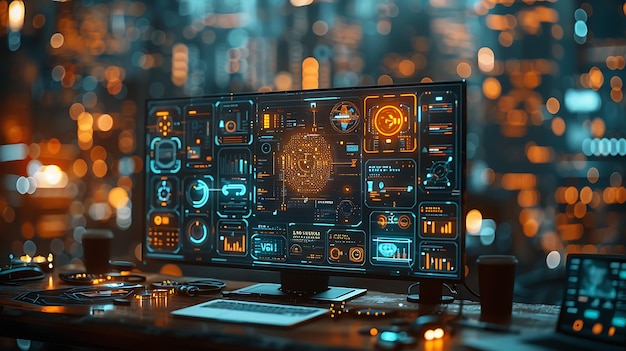Quick Read
5 Ways AI is Revolutionizing the Future of Coding
Artificial Intelligence (AI) is no longer a futuristic concept but a reality that is revolutionizing various industries, and coding is not an exception. The integration of AI into the world of programming is opening up new possibilities and transforming the way we develop software. Here are five ways how AI is making a mark on the future of coding:
Enhancing Code Writing with AI-Powered Tools
With the help of AI-powered tools, developers can now write more efficient and accurate code. These tools use machine learning algorithms to analyze existing code, understand coding patterns, and suggest improvements or even write the code themselves. By automating repetitive tasks and offering suggestions for complex problems, AI is making the process of writing code more productive and error-free. One popular example of such a tool is Kite, which uses AI to provide real-time code suggestions.
Improving Code Testing through AI
Code testing is an essential part of software development, but it can be time-consuming and error-prone. AI can help streamline the code testing process by analyzing the codebase, detecting potential issues, and suggesting corrective actions. For instance, Google’s AI-powered testing tool, Test Maker, uses machine learning algorithms to analyze test data and generate tests automatically. This approach not only makes the testing process faster but also more accurate, resulting in fewer bugs and improved code quality.
Predictive Coding with AI
Predictive coding is a new paradigm in software development that uses AI to understand the developer’s intentions and predict the next step. With this approach, the IDE (Integrated Development Environment) suggests code snippets, completions, or even entire functions based on the developer’s previous actions and context. Microsoft’s Visual Studio Intellicode is a notable example of a predictive coding tool. By providing suggestions in real-time, AI makes the coding process more efficient and allows developers to focus on solving more complex problems.
AI-Driven Code Optimization
Optimizing code for better performance is a common challenge faced by developers. However, with the help of AI, optimizing code can now be done more effectively and at scale. By analyzing large amounts of data, AI algorithms can identify inefficiencies, suggest improvements, and even rewrite code sections to optimize performance. For example, Google’s AI-powered compiler, Tangler, analyzes the entire codebase to identify and eliminate redundant code, resulting in faster execution times. This approach not only makes the code faster but also more maintainable, as the optimized code is easier to understand and modify.
5. Teaching Coding with AI
Finally, AI is also playing a crucial role in teaching coding to beginners. With the help of interactive learning platforms and AI-powered tutors, students can now learn programming in an engaging and effective way. For instance, IBM’s Watson for Education uses AI to provide personalized learning experiences by analyzing each student’s strengths, weaknesses, and progress, and offering custom recommendations based on their individual needs. By providing real-time feedback, suggestions, and guidance, AI makes the coding learning process more accessible and enjoyable for a wider audience.
Conclusion:
In conclusion, AI is making significant strides in the world of coding by enhancing code writing tools, improving code testing, enabling predictive coding, optimizing code performance, and even teaching coding. As AI continues to evolve, it is poised to transform the future of software development in unprecedented ways, making the process more efficient, accurate, and accessible.

Artificial Intelligence (AI): A Game Changer in the Digital Age and Coding
What is Artificial Intelligence (AI)?
ai refers to the simulation of human intelligence in machines that are programmed to learn, reason, and self-correct. It’s a broad field encompassing various areas like machine learning, natural language processing, robotics, and computer vision.
Impact of AI on Various Industries:
ai has been making waves in various industries, from healthcare to finance and transportation, by automating repetitive tasks, improving decision-making, and enhancing customer experiences.
Importance of Coding in the Digital Age:
With the increasing reliance on technology and digitalization, coding has become an essential skill for individuals and businesses alike. It enables the creation of websites, apps, and software that power our digital world.
Revolutionizing Coding with AI:
Now, let’s dive into how AI is revolutionizing coding. With the help of AI-powered tools, developers can write code more efficiently and accurately, as the AI systems suggest possible solutions, identify bugs, and even automate coding tasks.
Machine Learning (ML):
ML algorithms can learn from data and generate code snippets, making the coding process faster.
Natural Language Processing (NLP):
NLP enables developers to write code using natural language, simplifying the coding process for non-technical individuals.
Automated Bug Fixing:
AI systems can identify bugs and suggest fixes, saving developers time and effort.
Benefits of AI in Coding:
– Increases productivity
– Improves code quality
– Enhances developer experience
– Automates repetitive tasks
Future of Coding with AI:
As we move forward, AI is expected to become an integral part of the coding process, making it more efficient and accessible to a broader audience.
Way 1: AI-Powered Code Completion and Suggestions
Explanation of AI-powered code completion tools: Tabnine, Kite, and DeepCode are some of the leading AI-powered code completion tools that have been making waves in the development community.
Tabnine
utilizes deep learning and natural language processing techniques to provide suggestions that are contextually relevant, reducing the time and effort required for coding.
Kite
uses a similar approach, analyzing the context of the codebase to suggest relevant completions in real-time.
DeepCode
goes one step further by not only suggesting completions but also analyzing the quality of the code and providing suggestions for improvement.
Benefits:
The benefits of using AI-powered code completion tools are manifold. Firstly, they significantly increase productivity by suggesting relevant completions as you type, reducing the need to switch between different windows or documentation. Secondly, they help to minimize errors by providing suggestions that are semantically correct and compatible with the surrounding code. Lastly, they promote better coding standards by suggesting best practices and common conventions for your preferred programming language or framework.
Discussion on the future implications of AI-powered code completion:
As AI-powered code completion tools continue to evolve, they are poised to have a profound impact on software development.
Continuous improvement through machine learning
is one area where these tools are expected to excel, as they learn from your coding patterns and provide more personalized suggestions over time.
Adaptability to different programming languages and frameworks
is another key benefit, as developers can leverage the same tool for multiple projects without having to learn new shortcuts or interfaces.
Challenges:
Despite their many benefits, AI-powered code completion tools also present several challenges. Firstly, there are
security concerns
to consider, as these tools may have access to sensitive code and data. Ensuring that they are securely hosted and configured is essential to mitigate potential risks.
Ethical implications
are another area of concern, as the use of AI to automate certain tasks could potentially impact employment opportunities in the tech industry.
Potential impact on employment
is an area that requires ongoing discussion and debate within the development community, as we strive to balance the benefits of these tools with their potential impact on the workforce.

I Way 2: Automated Code Testing using AI
AI-based testing tools, like DeepTest and Diffblue, are revolutionizing the software testing landscape by automating the process of generating test cases. These tools employ advanced machine learning algorithms and natural language processing techniques to analyze the codebase and understand the logic behind it. Let’s delve deeper into how they work and the benefits they bring to the table.
Description of AI-based testing tools
DeepTest, developed by Microsoft Research, is an AI-powered testing tool that generates tests from natural language descriptions of software behavior. It uses deep learning models to understand the codebase and generate test cases based on its analysis.
Diffblue, developed by Google, is another innovative testing tool that generates unit tests using machine learning. It analyzes the codebase and creates assertions based on the expected outcomes, significantly reducing the time and effort required for manual testing.
Benefits of AI-powered code testing
The benefits of AI-based testing tools are manifold. They enable faster testing by automating the test case generation process, reducing the need for manual intervention. Additionally, they offer better coverage, as AI algorithms can identify edge cases and complex test scenarios that might be missed by human testers. Moreover, these tools significantly reduce the manual effort required for testing, allowing developers to focus on more strategic tasks.
Future implications of AI-powered code testing
The future implications of AI-powered code testing are promising. With machine learning algorithms continually improving, these tools will likely offer even greater test accuracy and coverage. Additionally, scalability is a significant benefit, as AI can easily handle large codebases and multiple testing scenarios simultaneously, offering cost savings to organizations.
Challenges of AI-powered code testing
However, there are also challenges associated with AI-generated tests. Ensuring their accuracy is a critical concern, as false positives or negatives could lead to serious issues in the production environment. Additionally, maintaining test coverage is essential to ensure that all parts of the codebase are being adequately tested. Finally, there are ethical concerns regarding potential job displacement in the testing industry as AI tools become more prevalent.

Way 3: AI in Bug Detection and Diagnosis
AI-driven bug detection systems, such as link, link, and link, are revolutionizing the way we approach software development and maintenance.
How they work:
These systems leverage advanced machine learning algorithms to perform continuous analysis of codebases, monitoring for vulnerabilities and issues. They analyze historical data, identify patterns, and learn from each new finding to improve their accuracy over time.
Benefits:
One of the most significant advantages of AI in bug detection and diagnosis is the ability to detect issues at an early stage. This allows for quick remediation, reducing potential damage and improving overall security posture. Furthermore, these systems can perform automated remediation, saving time and resources while minimizing the need for manual intervention.
Future Implications:
As AI continues to advance in this field, we can expect to see seamless integration with development workflows, providing real-time feedback and suggestions directly within the IDE or CI/CD pipeline. The scalability of AI-driven bug detection systems is another major advantage, allowing organizations to address vulnerabilities and issues across their entire codebase without the need for extensive manual effort.
Challenges:
While the benefits of AI in bug detection and diagnosis are undeniable, there are also challenges that must be addressed. One concern is privacy, as these systems may require access to sensitive code and data. Ensuring the security and confidentiality of this information will be a key consideration moving forward. Another challenge is ensuring accuracy. While AI has proven to be effective in identifying vulnerabilities and issues, it is not infallible. Human oversight and intervention will still be necessary to confirm findings and ensure that false positives are minimized. Finally, there is the potential impact on developer autonomy. While AI-driven systems can help improve efficiency and productivity, they may also lead to a decrease in the need for manual coding and debugging. Balancing these benefits with the importance of maintaining human expertise and skill will be an ongoing challenge.

Way 4:: AI-Driven Code Refactoring
Description of AI-refactoring tools like Sourcery and Ripple
AI-driven code refactoring is an innovative approach to software development that utilizes advanced artificial intelligence (AI) techniques to identify opportunities for improving the structure and maintainability of source code. Two notable examples of such tools are Sourcery and Ripple. These AI-refactoring tools analyze the entire codebase, learn from it, and suggest refactorings to developers.
How they work:
AI-refactoring tools, such as Sourcery and Ripple, analyze the entire codebase to identify potential opportunities for refactoring. They employ advanced algorithms and machine learning models to understand patterns and relationships within the code. By studying codebase metrics, language constructs, and design principles, these tools suggest improvements that can lead to better maintainability, readability, and overall software quality.
Benefits:
By automating the refactoring process with AI, developers can enjoy several benefits:
- Faster: Refactoring codebase becomes an efficient process as AI-driven tools can perform the tasks much quicker than humans.
- More accurate: The suggested refactorings are more precise and effective since AI tools have a broader understanding of the entire codebase.
- Reduced technical debt:: Regular application of AI-driven refactoring leads to a cleaner, more maintainable codebase that ultimately results in less technical debt.
- Improved maintainability:: Better organized and more readable code leads to an easier-to-maintain software system.
Discussion on the future implications of AI-driven code refactoring
The advent of AI-driven code refactoring has significant implications for the future of software development.
Adaptability to different programming languages and frameworks:
As AI refactoring tools continue evolving, they will be able to adapt to various programming languages and frameworks, making the development process more versatile for teams that work with different technologies.
Continuous improvement through machine learning:
As AI tools learn from the codebase, they will become more effective and sophisticated in their refactoring suggestions. This continuous improvement through machine learning can lead to better software design practices and a higher level of overall quality.
Challenges:
Despite the numerous benefits, there are challenges associated with AI-driven code refactoring. These include:
- Ensuring the quality of AI-suggested refactorings:: Developers must evaluate and review AI-generated suggestions to ensure they don’t introduce unintended consequences or issues.
- Maintaining developer oversight:: Humans must maintain control and direction to ensure that the AI refactoring tools are used effectively and in alignment with business goals.
- Ethical concerns regarding job displacement:: The use of AI for code refactoring might lead to concerns about the impact on employment opportunities.

VI. Way 5: AI in Generative Programming
Explanation of Generative Programming Concepts:
- Automated Programming (AP): AP uses AI to generate code based on input specifications. The AI model learns from existing codebases and generates new functions or programs. This approach can significantly reduce development time for repetitive tasks.
- Neural Architecture Search (NAS): NAS is an AI-driven approach to finding optimal neural network architectures. Instead of manually designing and tweaking network structures, NAS uses machine learning algorithms to discover the best architecture for a given task. This leads to more efficient and effective neural networks.
How they work:
Both AP and NAS rely on AI models to learn from existing code or data, then generate new code or architectures accordingly. Training these models involves providing large datasets of code examples or input-output pairs for the AI to learn from. As the AI becomes more proficient, it can generate new code with minimal human intervention.
Benefits:
- Rapid prototyping:: With AI-generated code, developers can create new applications quickly and efficiently.
- Optimization of complex systems:: Generative programming techniques can help optimize the design and implementation of intricate systems, making them more efficient and scalable.
- Reduced development time:: By automating the generation of code or architectures, developers save time and can focus on other aspects of their projects.
Discussion on the future implications of AI in generative programming:
Potential applications:
- Game development:: AI-generated code can be used to create complex game levels or behaviors, allowing for more dynamic and engaging gameplay experiences.
- Scientific simulations:: Generative programming can lead to the creation of more accurate and sophisticated scientific models, enabling researchers to make better predictions and discover new insights.
- Complex systems design:: Generative programming techniques can be applied to designing complex systems like traffic flow models, power grid optimization, and more, providing solutions that are more efficient and effective than traditional methods.
Challenges:
- Ensuring the accuracy of AI-generated code:: Developers must ensure that AI-generated code is accurate and effective, as incorrect or suboptimal code can lead to errors and inefficiencies.
- Maintaining control over generated code:: As AI becomes more capable of generating code, it’s essential to maintain control over the output and ensure that it aligns with the desired goals and requirements.
- Ethical considerations regarding intellectual property and authorship:: The use of AI to generate code raises questions about ownership and authorship, as well as potential ethical concerns related to the impact on human jobs and creativity.

V Conclusion
AI is revolutionizing the world of coding in numerous ways, and it’s essential to acknowledge these advancements. Code completion, for instance, allows developers to write code more efficiently by suggesting possible completions as they type.
Another groundbreaking application of AI is in
Impact on Coding and Developers’ Role
The potential impact of AI on coding is immense, and it’s crucial to reflect on the implications for developers. While these advancements can automate repetitive tasks, they also require a new set of skills from developers. Instead of focusing solely on writing code, the role of developers will evolve towards more creative and strategic problem-solving tasks.
Call to Action: Embrace Technological Shift with Ethical Considerations
It is a call to action for developers and organizations to embrace this technological shift. However, it’s essential to consider the ethical implications of AI in coding. Ensuring that AI is used responsibly and transparently will be crucial as it becomes more integrated into our workflows. This means understanding the data being used, addressing potential biases, and ensuring that AI is helping to create a better world rather than exacerbating existing issues.
Conclusion
In conclusion, AI is revolutionizing the way we code, from
